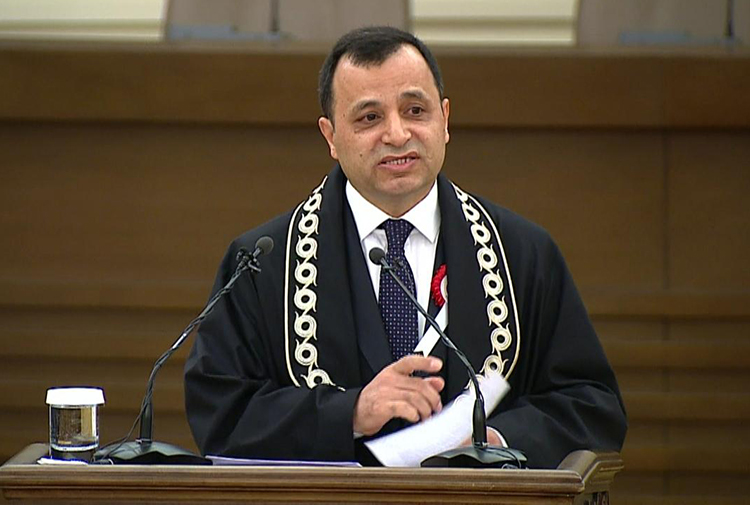Turkey’s outgoing chief justice, Zühtü Arslan, has stated emphatically that the decisions of the Constitutional Court are binding and must be followed, regardless of personal or institutional consensus, amid a deepening judicial crisis in which the Supreme Court of Appeals has defied the decisions of the top court, leading to the expulsion of an imprisoned lawmaker from parliament.
President Recep Tayyip Erdoğan, who was present at the swearing-in ceremony of Yılmaz Akçil, the newest member of the Constitutional Court, departed without giving a speech.
During the ceremony Arslan defended the integrity and mandatory enforcement of the top court’s decisions.
Emphasizing that the rulings of the Constitutional Court have a fundamental legal and constitutional basis, he stated, “There is no constitutional or legal basis for not following the rulings of the Constitutional Court due to differences of opinion and interpretation. Even if we disagree with the court’s decisions and interpretations, their implementation is a constitutional obligation.”
Arslan, who last February started his third term as head of the Constitutional Court, ending on April 17, 2024, made these remarks on what he said to be the last opportunity to dress a new member in his robes and share his thoughts on the role of the court and its judges. He emphasized the principle of fidelity to the promise made when he took office to protect the constitution and fundamental rights and freedoms.
Arslan emphasized the achievements of the Constitutional Court, especially in the last 10 years, in which he said the court has faced great challenges due to a review of laws and individual applications and praised the system of individual applications as one of the most important reforms and achievements in Turkish judicial history. He pointed out that the court does not discriminate in the processing of applications, including those of convicted politicians and journalists from different political backgrounds, thus ensuring the protection of press freedom and individual rights.
Arslan’s remarks follows a judicial crisis in which the top court had ruled twice that rights of Can Atalay, who was elected to parliament in May from the Workers Party of Turkey (TİP) and kept in prison despite gaining parliamentary immunity, were violated due to his continued incarceration. The 13th High Criminal Court, however, sent the case back to the Supreme Court of Appeals twice, defying the top court’s rulings.
The top appeals court, which in September upheld an 18-year conviction for Atalay in the Gezi Park trial, also defied the Constitutional Court’s rulings twice, leading to the eventual stripping of Atalay’s parliamentary status.
This disregard has raised concerns about the rule of law and the separation of powers in Turkey. Critics argue that disregarding the court’s decisions undermines democratic principles and legal certainty.
The ceremony, which was attended by members of the judiciary and President Erdoğan, was noteworthy due to the absence of a speech by Erdoğan, who left the event immediately after Arslan’s address, seen as a sign of the tense relationship between the executive and the judiciary, particularly with regard to respecting and upholding judicial independence and constitutional mandates.
In response to Arslan’s remarks, Mehmet Uçum, one of President Erdoğan’s chief advisors, disputed the interpretation that the Constitutional Court’s decisions on individual petitions fall under Article 153, which emphasizes the binding nature of the court’s decisions on the legislative, executive and judicial branches, as well as on individuals and legal entities.
Uçum has previously targeted the Constitutional Court for its decisions, calling it a “flawed institution,” emphasizing the need for a restructuring of the top court to align it with “national judicial norms” and free it from “Western and neoliberal biases.”
The Turkish judiciary faces widespread criticism for its perceived lack of independence. Critics accuse Erdoğan of exerting control over the judiciary and establishing one-man rule in the country, particularly after a coup attempt in 2016, following which he launched a massive crackdown on non-loyalist citizens and the country’s subsequent transition to a presidential system of governance, which granted him vast powers.
Many say there is no longer a separation of powers in the country and that members of the judiciary are under the control of the government and cannot make judgments based on the law.
In a development that validated the critics, Turkey was ranked 117th among 142 countries in the rule of law index published by the World Justice Project (WJP) in October, dropping one rank in comparison to last year.


